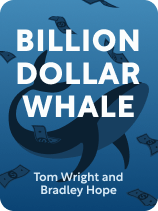

This article is an excerpt from the Shortform book guide to "Billion Dollar Whale" by Tom Wright and Bradley Hope. Shortform has the world's best summaries and analyses of books you should be reading.
Like this article? Sign up for a free trial here.
What is the PetroSaudi 1MDB controversy about? How did it all begin? How was Jho Low involved?
In Billion Dollar Whale, Tom Wright and Bradley Hope explain how a young Malaysian businessman convinced his country’s prime minister to invest billions of dollars in a deal with PetroSaudi. The deal ultimately led to what we now know as the PetroSaudi 1MDB controversy.
Read on to learn about the PetroSaudi 1MDB business deal, according to Wright and Hope.
The PetroSaudi 1MDB Controversy
In their book Billion Dollar Whale, Pulitzer finalists Tom Wright and Bradley Hope explain the rise and fall of Jho Low, who set up a deal in 2009 between 1Malaysia Development Berhad (1MDB) and PetroSaudi, an oil company controlled by Prince Turki Bin Abdullah of Saudi Arabia. This deal is what ultimately led to the PetroSaudi 1MDB controversy.
While Prince Turki’s domestic influence was limited, Low took advantage of his royal status to convince Prime Minister Najib Razak to invest in the PetroSaudi deal. Low’s plan was for PetroSaudi and 1MDB to co-invest in an oil exploration venture—together the two funds would buy up land, look for oil, and sell what they found. The sum total of this investment was billions of dollars. Low was indifferent to whether or not the oil investment became successful. As Wright and Hope argue, Low’s real purpose was to quietly siphon money away from the massive transactions that the PetroSaudi and 1MDB deal involved.
(Shortform note: While PetroSaudi was involved in Low’s shady dealings through 1MDB, the exact extent of this involvement is still debated. Some experts have alleged that PetroSaudi used illicit funds from 1MDB to expand operations in Venezuela, advancing their own oil exploration and buying new drilling ships. While PetroSaudi’s lawyers have continually denied this, the allegations are still being investigated by the Malaysian legal system.)
With Najib on board, Low’s next step was to convince banks to both process the deal and to send Low a cut. However, sending large sums to an individual as part of a transaction between sovereign funds made some institutions uncomfortable. When the first few banks refused to work with Low, he adopted a new strategy. Instead of trying to ease suspicion, Low chose to avoid it altogether. According to Wright and Hope, if a particular bank scrutinized Low’s transactions, he would simply test the waters at other institutions until he found one that was willing to work with him without questioning him. Using this strategy, Low found a group of financial institutions and individuals who were willing to cooperate with him on the PetroSaudi deal.
The 1MDB Scheme Continued to Expand
Wright and Hope note that as Low’s lifestyle grew increasingly expensive, he continued to set up deals at 1MDB that allowed him to take the money he needed to keep up with his expenses.
According to the authors, Low’s past successes brought him increased legitimacy and a wider network of contacts. Because he had worked with reputable institutions, individuals and banks viewed him with less scrutiny. On his next major deal, Low brought together the International Petroleum Investment Company (IPIC), a sovereign wealth fund owned by Saudi royalty, with Goldman Sachs on a plan to sell bonds through 1MDB. Goldman Sachs’s involvement is especially notable considering that they were once again engaging in questionable practices only a few years after their actions contributed to the subprime mortgage bubble crash.
As with the PetroSaudi deal, Low wasn’t trying to set 1MDB up for success. Low set up the deal with IPIC and Goldman Sachs solely so that he could poach a cut of the transactions involved in the deal, taking the money and moving it into his accounts or those of his associates.
(Shortform note: Human nature may help explain why Low was able to charm so many wealthy and powerful people into investing in his schemes. According to some experts, human beings tend to trust each other by default. These experts argue that the human tendency toward trust may help explain how white-collar criminals win others over—in many cases people are inherently too trusting to notice wrongdoing.)

———End of Preview———
Like what you just read? Read the rest of the world's best book summary and analysis of Tom Wright and Bradley Hope's "Billion Dollar Whale" at Shortform.
Here's what you'll find in our full Billion Dollar Whale summary:
- A chronicle of the rise and fall of Malaysian entrepreneur, Jho Low
- The tactics Low used to succeed as a con man
- The political and financial context for Low's scheme






